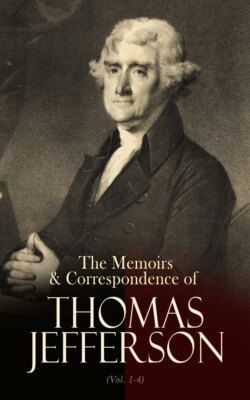Читать книгу The Memoirs & Correspondence of Thomas Jefferson (Vol. 1-4) - Thomas Jefferson - Страница 130
На сайте Литреса книга снята с продажи.
LETTER CX.—TO EDMUND RANDOLPH, September 20,1785
ОглавлениеTable of Contents
TO EDMUND RANDOLPH.
Paris, September 20,1785.
Dear Sir,
Being in your debt for ten volumes of Buffon, I have endeavored to find something that would be agreeable to you to receive, in return. I therefore send you, by way of Havre, a dictionary of law, natural and municipal, in thirteen volumes 4to, called Le Code de l’Humanité. It is published by Felice, but written by him and several other authors of established reputation. It is an excellent work. I do not mean to say, that it answers fully to its title. That would have required fifty times the volume. It wants many articles which the title would induce us to seek in it. But the articles which it contains are well written. It is better than the voluminous Dictionnaire Diplomatique, and better also than the same branch of the Encyclopédie Méthodigue. There has been nothing published here, since I came, of extraordinary merit. The Encyclopédie Méthodique, which is coming out from time to time, must be excepted from this. It is to be had at two guineas less than the subscription price. I shall be happy to send you any thing in this way which you may desire. French books are to be bought here for two thirds of what they can in England. English and Greek and Latin authors cost from twenty-five to fifty per cent, more here than in England.
I received, some time ago, a letter from Messrs. Hay and Buchanan, as Directors of the public buildings, desiring I would have plans drawn for our public buildings, and in the first place for the capitol. I did not receive their letter till within about six weeks of the time they had fixed on for receiving the drawings. Nevertheless, I engaged an excellent architect to comply with their desire. It has taken much time to accommodate the external adopted, to the internal arrangement necessary for the three branches of government. However, it is effected on a plan, which, with a great deal of beauty and convenience within, unites an external form on the most perfect model of antiquity now existing. This is the Maison Quarrée of Nismes, built by Caius and Lucius Cæsar, and repaired by Louis XIV., which, in the opinion of all who have seen it, yields, in beauty, to no piece of architecture on earth. The gentlemen enclosed me a plan of which they had thought. The one preparing here will be more convenient, give more room, and cost but two thirds of that: and as a piece of architecture, doing honor to our country, will leave nothing to be desired. The plans will be ready soon. But, two days ago, I received a letter from Virginia, informing me the first brick of the capitol would be laid within a few days. This mortifies my extremely. The delay of this summer would have been amply repaid by the superiority and economy of the plan preparing here. Is it impossible to stop the work where it is? You will gain money by losing what is done, and general approbation, instead of occasioning a regret, which will endure as long as your building does. How is a taste for a chaste and good style of building to be formed in our countrymen, unless we seize all occasions which the erection of public buildings offers, of presenting to them models for their imitation? Do, my dear Sir, exert your influence to stay the further progress of the work, till you can receive these plans. You will only lose the price of laying what bricks are already laid, and of taking part of them asunder. They will do again for the inner walls. A plan for a prison will be sent at the same time.
Mazzei is here, and in pressing distress for money. I have helped him as far as I have been able, but particular circumstances put it out of my power to do more. He is looking with anxiety to the arrival of every vessel, in hopes of relief through your means. If he does not receive it soon, it is difficult to foresee his fate.
The quiet which Europe enjoys at present, leaves nothing to communicate to you in the political way. The Emperor and Dutch still differ about the quantum of money to be paid by the latter; they know not for what. Perhaps their internal convulsions will hasten them to a decision. France is improving her navy, as if she were already in a naval war: yet I see no immediate prospect of her having occasion for it. England is not likely to offer war to any nation, unless, perhaps, to ours. This would cost us our whole shipping: but in every other respect, we might flatter ourselves with success. But the most successful war seldom pays for its losses. I shall be glad to hear from you when convenient, and am, with much esteem, Dear Sir,
your friend and servant,
Th: Jefferson.
